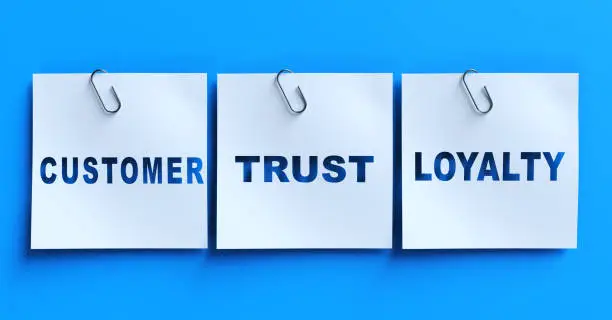Have you ever wondered why we tend to favor a particular brand when faced with options? We often find ourselves purchasing the same brand of shampoo, cereal, or clothing item repeatedly. We even go the extra mile to visit our favorite coffee shop, even if it’s not the most convenient option. It’s human nature to develop a liking for certain brands and become loyal to them. It’s like having a go-to or a tried and tested option that you can rely on.
This introduces us to the concept of brand loyalty. It is a feeling of steadfast devotion that customers have towards a particular brand, and it grows out of a strong emotional bond that is developed between the brand and its customers. This emotional connection is fostered over time, through consistent positive experiences with the brand. It’s what drives a customer to choose one product over another, even if there are cheaper or more convenient options available.
In this article, we’ll explore the ins and outs of brand loyalty – what it is, why it matters, and how you can build it. We’ll dive into real-life examples of brands that have successfully built a loyal following, as well as programs and strategies you can use to start building your own brand loyalty.
When a customer continuously purchases a product manufactured by a particular company despite attempts made by rivals to lure them, it is known as brand loyalty. Consumers who exhibit brand loyalty will persistently opt for the same product due to their belief that it surpasses other alternatives in the market. They remain loyal to a brand based on its quality, reliability, and consistency.
With a fan base spanning across continents and countries, Starbucks has emerged as one of the world’s leading coffee makers. The Seattle-based coffee shop not only prides itself on producing quality products but also makes it easy for customers to purchase their coffee.
The human mind has a remarkable ability to retain an emotional connection with a brand even when it cannot recall its name or a specific advertisement. This highlights the imperative role of branding and marketing in creating a loyal customer base. However, it is necessary to execute these marketing strategies with precision and prudency to ensure their effectiveness.
To cultivate brand loyalty, a company must first and foremost offer exceptional quality. No amount of celebrity endorsements or expensive marketing campaigns can make up for subpar quality. Nowadays, with the power of social media, poor quality can quickly lead to ridicule and negative publicity.
However, if a company strives to provide top-tier quality, then it can turn its customers into loyal fans who will promote the brand through positive word-of-mouth.
Your loyal customers won’t feel the need to explore alternative options because they are satisfied with the quality that their brand provides. Hence, quality serves as the foundation of brand loyalty, and companies should prioritize it above all else.
Ensuring exceptional customer service is an expensive endeavor that involves the employment of phone operators, chat representatives, support ticket staff, and social media managers.
However, this investment is worthwhile leading to increased customer satisfaction, henceforth paving the way for brand loyalty that yields significant returns.
In today’s crowded market, the quality of service a brand provides can be the only factor that sets it apart from its competitors. For customer service to strengthen brand loyalty, customers must have access to user-friendly feedback systems and be able to register complaints. You need to ensure that your customer support staff are well versed and trained to address customer needs and promise prompt action.
Companies use various strategies to promote their products and services. While some rely on loyal customers to share their experiences on social media, others hire brand ambassadors to represent their brand.
The ideal brand ambassador must possess a solid marketing background, and a well-developed digital footprint with an active community across various platforms such as blogs, webinars, and emails besides social media.
Additionally, they must have a genuine and polished personality, extensive knowledge and understanding of the products and services they represent, and outstanding skills in building and nurturing customer relationships.
Let us further delve deeper into the benefits and types of brand loyalty programs.
Credits towards future purchases, exclusive promotions, discounts, personalized recommendations based on buying habits, and early access to new products are among the benefits that these customers are conferred with.
These benefits enhance customer experience and encourage them to remain loyal to the brand.
Mentioned below are four types of brand loyalty programs:
A loyalty scheme that operates on a subscription model draws in customers to pay an upfront fee on a monthly or yearly basis to be a part of it. This type of program is particularly advantageous for businesses that aim to retain customers for a known period.
Loyalty programs that use a points-based system have gained widespread popularity, especially in the retail industry, such as restaurants. These programs incentivize customers to make purchases by awarding them points for each transaction. Once customers accumulate a certain number of points, they can redeem them for discounts or free products.
Loyalty programs often incorporate tiered systems that grant varying levels of benefits to customers based on their program tier. The higher the tier, the more perks and rewards customers receive. Some programs use naming conventions, such as silver, gold, or platinum to encourage customers to spend more and reach the higher tier of the program for greater benefits.
Rather than offering discounts or promotions, a value-based program operates by donating a portion of its earnings to one or more charitable organizations. This allows customers to select the charity that best aligns with their personal values.
The goal of organizations employing value-based loyalty programs is to foster stronger bonds with their customers.
Brand loyalty has a significant impact on consumer behavior. Consumers tend to stick with brands they are loyal to, even when competitors offer similar or better products. This is due to the emotional connection and trust they have developed with the brand over time.Brand loyalty also influences consumer decision-making. Loyal customers are more likely to purchase additional products and services from the same brand, and at the same time recommend it to others. This leads to increased sales and revenue for the brand.
For instance, one of the key factors contributing to Nike’s continued success in the athletic wear industry is its strong brand loyalty. Nike’s loyal customers are willing to pay a premium for their products, and this trust extends to the brand’s free-of-charge products, such as shoes, socks, and workout gear. Customers are more likely to purchase these items from Nike because they trust the brand’s quality and expertise in the industry.
An influential brand with a cult-like following is capable of generating immeasurable profit in the long run, provided it adheres to these marketing strategies and maintains consistency.
This revenue in turn allows companies to allocate capital to improve products or enhance customer service for repeat customers, rather than investing in acquiring new clients. This provides an added advantage to companies, allowing them to focus on enhancing the customer experience.

